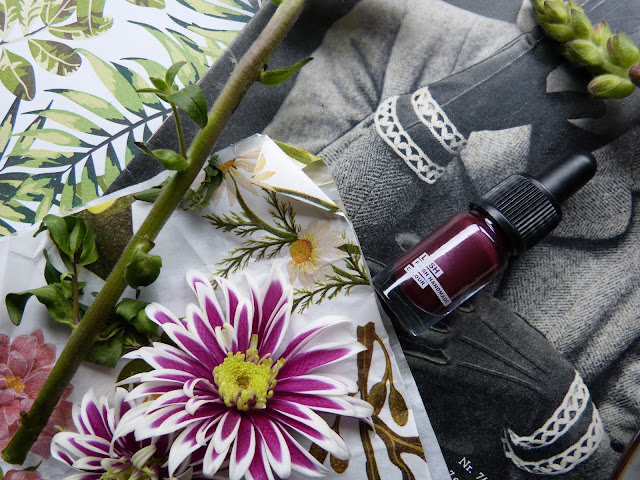I love fashion and make-up for the way it helps me to express myself. I can show my taste and values through the clothes I wear. My red Chanel lipstick is basically me in a bottle. I take pride in being greeted as 'the Chanel-girl' when walking into our local beauty store. The connotations that come with it, being luxurious, classy and quality, is thanks to my lipstick reflected to the world. I (want to) identify myself with these connotations. My self-perception and expression are build on these qualities. Which I happily show off every time I casually take out my make-up bag, pick up my lipstick and pout my lips.
"I happily ignored my gut feeling and betrayed my values for a brand."
Or at least: I used to. I used to take pride in being 'the Chanel-girl'. I happily ignored my gut feeling and betrayed my values for, essentially, a brand. Because it's easier to turn a blind eye to the facts when being too busy trying to express your identity. Catchphrases like L'Oréals 'Because I'm worth it' directly plays with this idea. Valueing yourself above anything else. As Rebecca Breuer cites philosopher Simon Blackburn in her dissertation: "Since we are worth it the urgency to think about related issues, such as whether the people that produce our clothes and cosmetics, the generations to come and our environment are of equal worth, seems to dimnish or at least becomes bearable."[1]
The bear necessities
In 2004 the European Union banned animal testing for finished cosmetic products. And in 2009 they also banned animal testing for ingredients used within cosmetic products. In 2013 these bans got replaced by the Cosmetic Regulations act, which basically states the same thing, but also includes a ban on selling animal tested products.[2] But this doesn't mean that all cosmetic products produced or sold within the European Union are cruelty free. According to PETA in 2016 more than 250 brands still tested on animals which affects, according to the RSPCA, over 27.000 animals a year.[3]At the beginning of 2016 I reached a point where I couldn't ignore my choices any more. I was shown the 'roots' of my justifications and reasoning and didn't like what I saw. By offering a new way of thinking, or at least an 'extra component' to my original thinking process, I decided to put my money where my mouth is. Because do I really value my 'Chanel-girl' status over the lives of 27.000 animals?
Identity politics
Although Rebecca Breuer's dissertation focusses on fashion, I think the points she makes are applicable to make-up too (not least because cosmetic products are often sold by fashion brands). She for instance writes about the way marketing promotes overconsumption, vanity and the importance of self-esteem only as an incentive of gaining capital. By playing with identity politics brands have internalised and naturalised the idea that fashion is representable to our being.[4]"Without being aware of our contribution, production is exchanged for profit."
Because I was so busy being 'the Chanel-girl' I gleefully forgot or ignored what this meant besides the branded connotations. Breuer: "Without being aware of our contribution, production is exchanged for profit (...)."[5] And this profit isn't often concerned with sticking to morals. Just look at NARS, who as a company apparently favours increasing their market and swaps their cruelty free status for more sales as if it meant nothing.[6]
Battling bunnies
Although animal testing within the cosmetic industry becomes increasingly scrutinesed, it's still an ongoing battle. Not least because of the way brands are selling their products as a confirmation or extension of 'self', deflecting from the bigger picture. Because this bigger picture shows it's OK to pour chemicals into the eyes of rabbits in favour of profit.The connotations of condoning and funding torture opposed to luxury and class really made me think twice about 'the Chanel-girl'. Although I've decided to use the products until they run out (almost there), the pride for my red lips has faded to an ultimate low point. Because no, I do not value representing my personal identity through brands who test on animals as a way to gain more profit above harassing, hurting and torturing animals.
Do you?
RECOMMENDED: This Is Love
| Instagram | Bloglovin | Tumblr | Twitter | Pinterest | Youtube |
Comment below!
(And click on 'notify me' so you can read my reply!)
Comment below!
(And click on 'notify me' so you can read my reply!)
Pin this post!
Sources:
[1] R.L. Breuer, Fashion Beyond Identity: The Three Ecologies of Dress (University of Amsterdam, 2015), p. 143.
[2] European Commission, "Ban on Animal Testing", https://ec.europa.eu/growth/sectors/cosmetics/animal-testing_en.; Cruelty Free International, "EU ban on cosmetics testing and why the Leaping Bunny is still needed", https://www.crueltyfreeinternational.org/what-we-do/corporate-partnerships/eu-ban-cosmetics-testing.
[3] K. Chitrakorn, "Is the Clobal Cosmetics Market Moving Towards a Cruelty-Free Future?" (13 January 2016), https://www.businessoffashion.com/articles/intelligence/is-the-global-cosmetics-market-moving-towards-a-cruelty-free-future.
[4] See note 1, p. 144.
[5] See note 1, p. 197.
[6] S. Young, "NARS Cosmetics boycotted by consumers as it announces it's no longer a cruelty-free brand" (29 June 2017), http://www.independent.co.uk/life-style/fashion/nars-cosmetics-boycott-cruelty-free-brand-no-longer-consumers-chinese-market-china-animal-a7814466.html.












